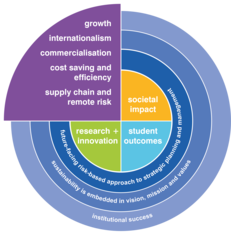A Guide for Members of Governing Bodies – Financial Resilience
Sustainability is a key driver of innovation and enterprise, which contributes to growth and competitiveness by fostering new ways of working as well as new programs and services. Increasingly, opportunities for sustainable innovation arise from areas like energy storage, modular design and social enterprises and present real commercial opportunities for universities.
Improving energy and resource efficiency is not only good for the environment but can also deliver significant cost savings for universities. This agenda is increasingly relevant given rising costs, greater regulatory focus on value for money, and growing public intolerance of wasteful, environmentally harmful behaviours by public institutions - the recent rapid rise in public concern about plastics being a good example.
Predicting the direction of regulatory and policy changes - such as future energy and carbon taxes - is challenging but sustainable institutions are better placed to adapt to change. Sustainability regulation can increase access to capital for forward-thinking institutions. For example, the Scottish Government launched a £20m interest-free loan fund in 2018 to accelerate carbon reduction in Scottish higher education. (9)
Higher education institutions that take a broader view of investment - by acknowledging the relevance of environmental, social and governance factors - stand to enhance their reputation as leading global institutions and thereby safe-guard the value and performance of their investments.
Sustainability is a key element in attracting and retaining talent. The workforce is increasingly made up of millennials and Generation Z who care about sustainability and who want to work for an organisation that reflects their values. As such, sustainability also drives productivity given employees who share an organisation’s values are more engaged.
Universities need to manage risks in their supply chains and operate within the law on bribery, corruption and criminal activities. Action to positively impact social and environmental issues in supply chains can help win support from funders and partners – at home and overseas.
(9) Outline of University Carbon Reduction Fund in Scottish Government (2018) Infrastructure Investment Plan 2015: www.gov.scot/Publications/2018/04/4830/7
Questions a governor might explore:
- Is there value in moving beyond compliance with existing laws associated with social responsibility and sustainability?
- What is our approach to sustainable investing?
- Are we seizing the value for money opportunities that comes from good environmental governance?
- Have we explored the opportunities that the increasing move to social enterprises brings?
University of Edinburgh – Sustainable Campus Fund
The Sustainable Campus Fund is an internal investment vehicle that finances energy efficiency and renewables projects on campus.
£4.75m will be invested over five years, in innovative projects that provide a sound financial return, carbon savings and the potential for scalability. £1.25m of projects were funded in the first two years, which yielded financial savings of £370,000/year and carbon savings of 1300tCO2e/year. Approved projects have an average ROI of 288% and a combined payback of 3.9 years. The strong financial performance of this innovative funding model has attracted the attention of other public sector institutions and support from funding bodies (10).
(10) University of Edinburgh (2016) Sustainable Campus Fund Business Case








 Except where otherwise stated, content on this site is
licensed under a Creative Commons Attribution 3.0 License.
Except where otherwise stated, content on this site is
licensed under a Creative Commons Attribution 3.0 License.
